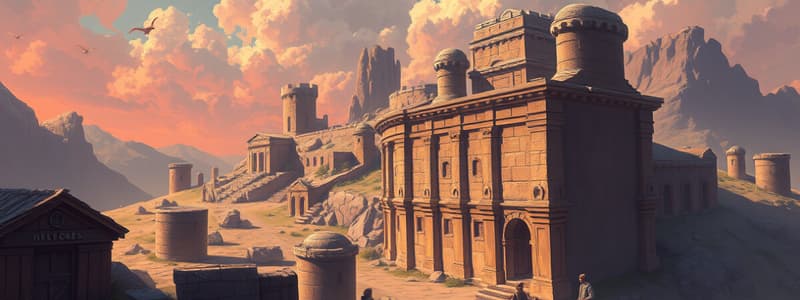Podcast
Questions and Answers
¿Qué es la historia?
¿Qué es la historia?
Acontecimiento que ocurren en la humanidad para poder ser registrados
¿Qué son los métodos históricos?
¿Qué son los métodos históricos?
Metodología usada por los historiadores para estudiar y analizar los hechos ocurridos en el pasado
¿Cuál es el objeto del método histórico?
¿Cuál es el objeto del método histórico?
Escribir, producir la historiografía para establecer los acontecimientos de la forma más objetiva posible
¿Cuáles son las etapas en la historia del derecho?
¿Cuáles son las etapas en la historia del derecho?
¿Cuál fue la principal aportación de la época arcaica?
¿Cuál fue la principal aportación de la época arcaica?
¿La época preclásica abarca desde el 376 hasta el 27 a.C?
¿La época preclásica abarca desde el 376 hasta el 27 a.C?
¿Qué documento es considerado como fundamental en la época justinianea?
¿Qué documento es considerado como fundamental en la época justinianea?
¿Qué es el derecho comparado?
¿Qué es el derecho comparado?
¿Quiénes fueron algunos de los filósofos importantes de Grecia?
¿Quiénes fueron algunos de los filósofos importantes de Grecia?
La época clásica se caracteriza por el surgimiento de _____
La época clásica se caracteriza por el surgimiento de _____
La legislación carece de influencia del pueblo según el contenido presentado.
La legislación carece de influencia del pueblo según el contenido presentado.
Flashcards
What are historical methods?
What are historical methods?
The systematic study of past events through the analysis of historical sources, aiming for objectivity and accuracy.
What are historical sources?
What are historical sources?
Written works, documents, artifacts, and other evidence that historians use to learn about the past.
How do historical methods analyze sources?
How do historical methods analyze sources?
Using historical sources to evaluate and interpret events, focusing on the past's impact on the present.
What is the history of law?
What is the history of law?
Signup and view all the flashcards
What is the 'Archaic Period' in the history of law?
What is the 'Archaic Period' in the history of law?
Signup and view all the flashcards
What is the 'Pre-Classical Period' in the history of law?
What is the 'Pre-Classical Period' in the history of law?
Signup and view all the flashcards
What is the 'Classical Period' in the history of law?
What is the 'Classical Period' in the history of law?
Signup and view all the flashcards
What is the 'Post-Classical Period' in the history of law?
What is the 'Post-Classical Period' in the history of law?
Signup and view all the flashcards
What is the 'Justinian Period' in the history of law?
What is the 'Justinian Period' in the history of law?
Signup and view all the flashcards
What is comparative law?
What is comparative law?
Signup and view all the flashcards
How did Greek civilization influence law?
How did Greek civilization influence law?
Signup and view all the flashcards
Study Notes
Métodos Históricos
- Los métodos históricos son metodologías utilizadas por historiadores para estudiar y analizar eventos pasados.
- El objetivo principal del método histórico es escribir historiografía y establecer acontecimientos de manera objetiva y sin sesgos.
- La construcción del método histórico se realiza a través de fuentes como libros, citas, testimonios y diversas disciplinas.
- Características incluyen la combinación de técnicas para investigar, describir y narrar eventos de diferentes épocas.
- El análisis objetivo de fuentes permite interrelacionar hechos actuales con patrones del pasado y formular hipótesis sobre eventos históricos.
- Pasos para realizar una investigación histórica: identificar fuentes, evaluar su relevancia, y plantear argumentos basados en las fuentes.
Historia del Derecho
- Estudia la ciencia jurídica desde una perspectiva histórica, analizando la evolución del derecho a lo largo del tiempo.
- La generación del derecho proviene del legislador, dogmática jurídica, jurisprudencia y la influencia del pueblo.
Etapas en la Historia del Derecho
- Época Arcaica*
- Fundada en 753 a.C. con Roma; abarca la Monarquía y la República.
- Principal contribución: Las XII Tablas.
- Época Preclásica*
- Desde 376 a.C. hasta 27 a.C.; parte de la República y el Imperio Romano.
- La oligarquía actúa como base del estado y aparecen conceptos básicos de derecho.
- Época Clásica*
- Desde 27 a.C. hasta 284 d.C.; destaca el surgimiento de la constitución principium.
- Tipos de normas: edicto, mandato, decreto y restricto; Institutas de Gayo abarcan temas de personas, cosas, obligaciones y procedimientos judiciales.
- Época Posclásica*
- Desde 284 hasta 476 d.C.; se formaliza la creación del derecho y la enseñanza relacionada.
- Ulpiano elabora sus reglas en esta época.
- Época Justinianea*
- Desde 476 hasta 565 d.C.; reconocida como la edad de oro del Imperio Bizantino.
- Creación del Corpus Iuris Civilis por Justiniano.
Civilizaciones Influyentes
- Grecia, con su importancia cultural, es fundamental en el desarrollo de la filosofía y el derecho.
- Principales figuras: Sócrates, Platón, Aristóteles; su influencia se extiende al marco jurídico.
- Ciudades relevantes incluyen Atenas y Esparta; la participación política estaba restringida a los hombres.
Evolución de las Instituciones Jurídicas
- Las primeras comparaciones de derecho se originan en escritos de Platón en la antigüedad.
- El término "derecho comparado" se formaliza a mediados del siglo XIX.
- Primer congreso internacional del derecho comparado se celebra en París en 1900.
- La Liga de las Naciones (1920) no tuvo éxito; mientras que la ONU se funda en 1946.
- La Declaración Universal de los Derechos Humanos de 1948 fue coordinada por Eleanor Roosevelt.
- El derecho comparado estudia las relaciones entre sistemas jurídicos y busca la adaptación de normas eficaces.
Studying That Suits You
Use AI to generate personalized quizzes and flashcards to suit your learning preferences.




